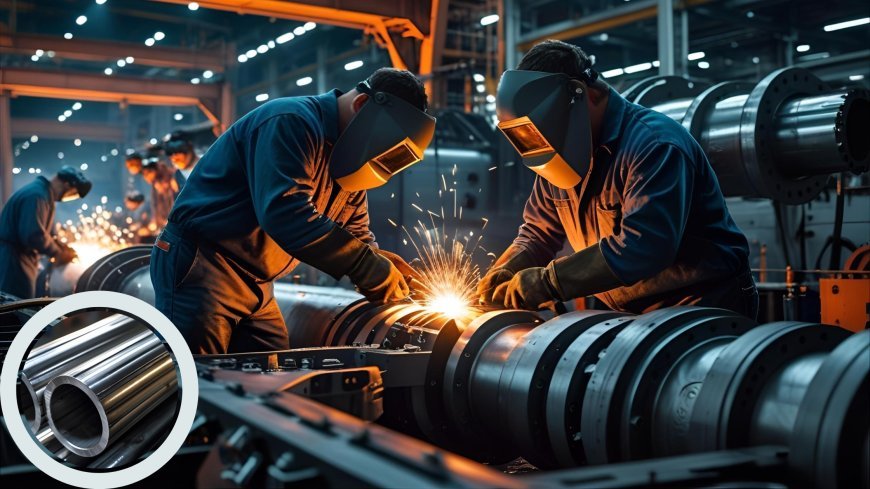Exploring the Engineering Backbone of Ships

The majestic sight of a cargo ship cutting across the open sea may seem serene, but beneath the decks lies a thunderous world of steel, steam, and science. Marine machinery—the mechanical systems that power and support ships—are responsible for keeping these vessels operational 24/7, often under punishing environmental conditions. From propulsion to power generation, cooling systems to fire control, ship machineries represent a complex blend of applied physics, engineering, and materials science.
In this article, we explore ship machineries from the ground up: how they work, the science behind their operation, and why advanced materials like stainless steel 904L are crucial for reliability and safety in harsh marine environments.
I. A Complex System at Sea: Understanding Ship Machineries
Marine engineering is a field of precision, and ship machinery is at the center of it all. Ship machineries are not just single engines or pumps—they are integrated systems composed of hundreds of interconnected machines and control elements that together keep a vessel seaworthy.
Some of the most critical machinery systems include:
-
Main propulsion engines: Typically large two-stroke or four-stroke diesel engines or electric motors.
-
Auxiliary engines: Provide electric power to onboard systems, such as lighting, sensors, and automation units.
-
Cooling systems: Control engine and machinery temperatures using seawater or freshwater circuits.
-
Pumps and compressors: Manage fluid movement, from bilge water to fuel oil to compressed air.
-
Boilers and steam plants: Provide steam for heating, auxiliary power, or freshwater production.
Each piece of equipment must perform flawlessly under continuous vibration, thermal cycling, and exposure to saltwater and fuel residues. This is where the application of scientific principles becomes crucial.
II. Physics and Engineering Principles in Action
Every major system on a ship is governed by fundamental scientific laws. Engineers must understand and apply these principles to design safe, efficient, and durable machinery.
1. Thermodynamics
Thermodynamic cycles like the Otto, Diesel, and Rankine cycles are the basis for engine and boiler operations. Understanding energy conversion, entropy, and heat transfer is critical to optimizing fuel efficiency and thermal output.
2. Fluid Mechanics
Piping systems, pumps, and cooling circuits depend on fluid dynamics. Calculations involving pressure drops, turbulence, and flow rates help determine pipe diameters and pump capacities.
3. Materials Science
The choice of materials for machinery parts and housing structures relies on a deep understanding of metallurgy, corrosion science, and fatigue mechanics. Materials must endure:
-
Mechanical loads (static and dynamic)
-
Corrosive exposure (saltwater, acidic gases)
-
High and low temperatures
-
Cyclic stress and vibration
It is here that stainless steel grades like 904L become indispensable.
III. Why Material Choice Matters in Marine Machinery
Ships operate in a uniquely hostile environment. Exposure to seawater accelerates corrosion. Variable temperatures cause thermal expansion and contraction. The result? Material degradation—unless the right alloys are chosen.
Common Problems in Ship Machinery Materials:
-
Pitting corrosion from chloride ions in saltwater
-
Crevice corrosion under gaskets and clamps
-
Stress corrosion cracking in high-load areas
-
Galvanic corrosion between dissimilar metals
Stainless Steel 904L: A High-Performance Solution
904L stainless steel was initially developed for aggressive industrial settings involving strong acids. However, its performance characteristics have made it increasingly popular in marine applications.
Key Advantages:
-
Exceptional corrosion resistance, especially against chlorides
-
Excellent weldability and formability
-
Superior strength at high temperatures
-
Long service life, reducing maintenance cycles
Applications in ship machineries include seawater piping, heat exchanger tubes, ballast water systems, and fuel oil filters. Choosing a qualified ss 904l tube manufacturer ensures that these critical components meet the exacting standards of marine operations.
IV. The Vital Role of Tubing and Piping in Marine Machinery
Pipes and tubes are the circulatory system of a ship. They deliver fluids—fuel, lubricants, coolants, steam, and compressed air—throughout the vessel.
Tubing Applications:
-
Heat exchanger coils
-
Fuel injection systems
-
Boiler coils
-
Oil cooling loops
Piping Applications:
-
Ballast water transfer
-
Firefighting lines
-
Engine room systems
-
Freshwater distribution
These systems face continuous flow, pressure surges, and chemical exposure. Corroded or failed piping is one of the leading causes of engine room downtime and safety incidents. That’s why partnering with a trusted ss 904l pipe supplier is critical to ensure durability, corrosion resistance, and compliance with IMO and SOLAS regulations.
V. Supporting Systems: The Unsung Heroes of Ship Operations
While propulsion engines often take the spotlight, many auxiliary systems are equally essential. Each of these systems requires machinery designed with precision and materials engineered for resilience.
1. Ballast Water Treatment Units
These systems help control ship stability and must now meet environmental discharge standards. High-alloy steels like 904L are used in UV reactors and filtration systems due to their corrosion resistance and compatibility with seawater.
2. Steering Gear Systems
Hydraulic and electro-hydraulic systems that control rudder movement involve pumps, actuators, and control valves that require high-tolerance machining and strong materials.
3. HVAC and Ventilation Systems
To maintain air quality and temperature across living and engine room spaces, fans and compressors are used—often connected via stainless steel ducts and tubing to resist internal condensation and salt air exposure.
VI. Heat Management: Boilers and Heat Exchangers
Boilers are commonly used to produce steam for heating and auxiliary power. Meanwhile, heat exchangers regulate engine and machinery temperatures by transferring heat between working fluids and seawater.
In both cases, tubing materials are under constant stress:
-
Thermal cycling
-
Chemical exposure
-
High pressures
Stainless steel 904L is frequently chosen for these components due to its ability to maintain integrity across thermal gradients and aggressive conditions.
VII. Future Trends in Marine Machinery: Sustainability and Intelligence
As the maritime industry adapts to tighter emission regulations and rising fuel costs, the design and operation of ship machinery are evolving.
1. Green Propulsion Technologies
-
LNG and hydrogen-fueled engines
-
Battery-electric propulsion
-
Wind and solar-assisted propulsion
These new technologies require different supporting systems, such as cryogenic pumps or power inverters, all of which bring unique material challenges.
2. Smart Ship Engineering
The emergence of digital twins, AI-driven maintenance, and real-time monitoring systems is changing how marine machinery is designed and managed. Sensors embedded in engines, pumps, and pipes now provide data on performance, corrosion, and wear, enabling predictive maintenance.
3. Advanced Materials
Beyond 904L, new materials are emerging:
-
Duplex stainless steels
-
Nickel-based alloys
-
Non-metallic composites (used in impellers and exhaust systems)
Nonetheless, high-alloy stainless steels like 904L remain a gold standard where both strength and corrosion resistance are required.
VIII. Regulatory Compliance and Quality Assurance
All ship machinery and components must comply with international standards, including:
-
IMO (International Maritime Organization)
-
SOLAS (Safety of Life at Sea)
-
DNV, ABS, Lloyd’s Register, and other class societies
Materials like SS 904L must be certified and tested for:
-
Tensile and yield strength
-
Chemical composition
-
Non-destructive testing (NDT)
-
Corrosion testing (ASTM G48, ASTM A923)
That’s why it’s vital to source from reputable manufacturers and suppliers who meet these certifications.
Conclusion: The Science That Powers the Seas
Ship machineries are more than mechanical parts—they are a product of centuries of engineering evolution and modern scientific understanding. From the thermodynamic principles behind diesel combustion to the molecular behavior of corrosion-resistant alloys, science defines how ships move, survive, and thrive at sea.
Stainless steel 904L continues to be a material of choice in this harsh, high-demand environment. Whether you’re procuring components for a naval ship or a commercial cargo vessel, working with a certified ss 904l tube manufacturer and partnering with a reliable ss 904l pipe supplier ensures your machinery systems are built for resilience and performance.
In the end, every voyage a ship makes is powered not just by engines, but by a profound application of science and engineering—transforming raw materials and physical principles into one of the greatest achievements of human technology: the modern ship.
What's Your Reaction?

























































